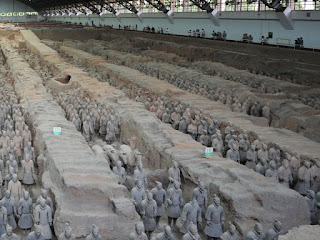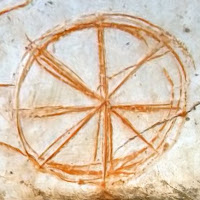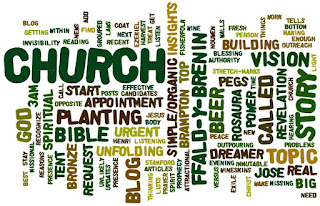Leaders in the church, Part 1< No earlier items |
Index |
Follow my leader >How should we manage and govern our meetings? How is church to be led? Everything changed in the 1960s and 70s as the Holy Spirit swept into the denominational church. Existing churches were impacted, the house church movement began, and new streams of church sprang up.My wife and I have a long-standing difference of opinion about church leadership. Let me explain.
Donna is a member of
Open Door Church, part of
New Frontiers, one of the new streams of churches that, like others, has its roots in the
Charismatic Movement of the 1960s and 70s.
The bursting out of the new wine of the Holy Spirit wasn't easily retained by the old wineskins of denominational church. What was known as the British house church movement began at that time.
New Frontiers and the
other streams of the time were based on the view that new organisations were needed. Of course, some Anglican, Catholic and non-conformist churches did embrace the fresh outpouring of spiritual gifts. The
pentecostal denominations were already active in that way. But there were many 'refugees' from old fashioned denominationalism and also many new believers who had never tasted a particular form of church. The new streams aimed to cater for both groups.
Staying small and open - But there were many others (of whom I am one) who felt that the new streams of church life took on far too much from the old ways. Having a leadership structure and meeting in a large building were the most obvious of these old ways (though there are many others). Used as we were to meeting at home without leaders, sharing meals together, and giving the Spirit complete freedom to lead us in praise and worship, we were quite unable to feel comfortable with any kind of organisation.
And that's the basis on which Donna and I have different views. She is very much at home in an organisation with a structure, a building, and management. I am at home as part of an organism with very little structure, no building, and managed and directed by the Spirit of Christ alone.
Another kind of small group - We do overlap in one important way. She is one of three leaders of an Open Door Small Group that meets every Tuesday evening, and I am glad to be part of that group. The meetings are in some ways rather like organic church. We meet in homes, we usually start with a shared meal, there is plenty of opportunity to chip in with a thought, a prophecy, a tongue, a vision or a prayer.
On the other hand the meetings are structured around three main elements and are managed hierarchically. Meetings normally begin with a meal, then worship led by a member of the group, next questions and a discussion based on the previous Sunday's 'preach', and finally a time of prayer on topics raised by those present. The Small Group leaders report to neighbourhood leaders who in turn are responsible to the elders of Open Door and in particular to the lead elder.
Donna is comfortable with these arrangements, I am less so. But we both enjoy the meetings and are grateful to be able to share in them regularly together.
The role of the Spirit - But it's not just a matter of how meetings are organised. There is also plenty of evidence that the Holy Spirit fills every available gap that we concede to him. I have a great deal of experience of this going back many years and also in recent times. Meetings that are completely open, not planned or governed by us in
any way, are little pockets of time and space that he joyfully, even gleefully inhabits. Many times I have witnessed him working amongst us in amazing and unexpected ways, but always when he is given the freedom to do it.
It takes courage to attempt this. Things can go wrong. People can get in the way. We cannot come to this place without taking risks. But when we are prepared to step aside and let the Spirit of Christ move among us freely, he will fill the place. The more space and time we give him, the more present he becomes.
And I am convinced that out of such a place of blessing we are better equipped to go out and, in our going, to make disciples (Matthew 28:18-20).
Profitless discussion - A couple of days ago Donna and I had a rather profitless discussion about church leadership. (I take full responsibility for my unhelpful attitude.) I'm going to outline it here because it pinpoints the issues, points to a way forward and may be helpful to others thinking these issues through. Here's how it happened.
We were about to begin reading James together when Donna spotted Hebrews 13:17 on the opposite page. She asked me a direct question, 'How do you explain this verse if you don't think the church should have leaders?'
Indeed the church does have leaders. But they are understated and not people who rule or manage. They are recognised by those around them, not appointed by other leaders or by a committee.
But instead of saying this I responded to Donna's question by digging into the Greek and pointing out that you must translate any passage in sympathy with the general thrust of the entire New Testament. What Jesus did and said and what we read in the other letters must inform and guide us. Translation is not an exact art. The flavour of the English words we select to represent the meaning of the Greek must depend partly on that wider context. So we talked about the text rather than the concept of leadership.
The discussion went pear-shaped and we never did make it as far as reading James that evening. Partly because of this I feel the time has come to study church leadership in more detail and to be clearer in my own mind about the biblical background and the practicalities.
There are other associated issues and I think I need to look at them as a whole, not piecemeal. So I plan to come back to this topic from time to time as I make progress with the study.
Meanwhile, I would be very grateful for any thoughts or feedback you might have on the different approaches to church leadership and church government. Please leave a comment.
Questions:- Have you had similar or related experiences? Please consider sharing them in a comment.
- What are your views on the Holy Spirit's involvement in your meetings? Is he fully present? Is he fully visible and audible?
- If you could change one thing about your meetings, what would it be?
Challenge:- Try this at home. Meet with some close friends with no agenda and no preparation of any kind. Share a meal gratefully remembering Jesus' presence with you. After the meal sit in a comfortable place together and focus on Jesus. Don't mind silences, but share together anything the Spirit shows you, including pictures, words, prophecy, Bible passages, persistent thoughts and more. What happened? Report back here with a comment.
See also:
< No earlier items |
Index |
Follow my leader >





















